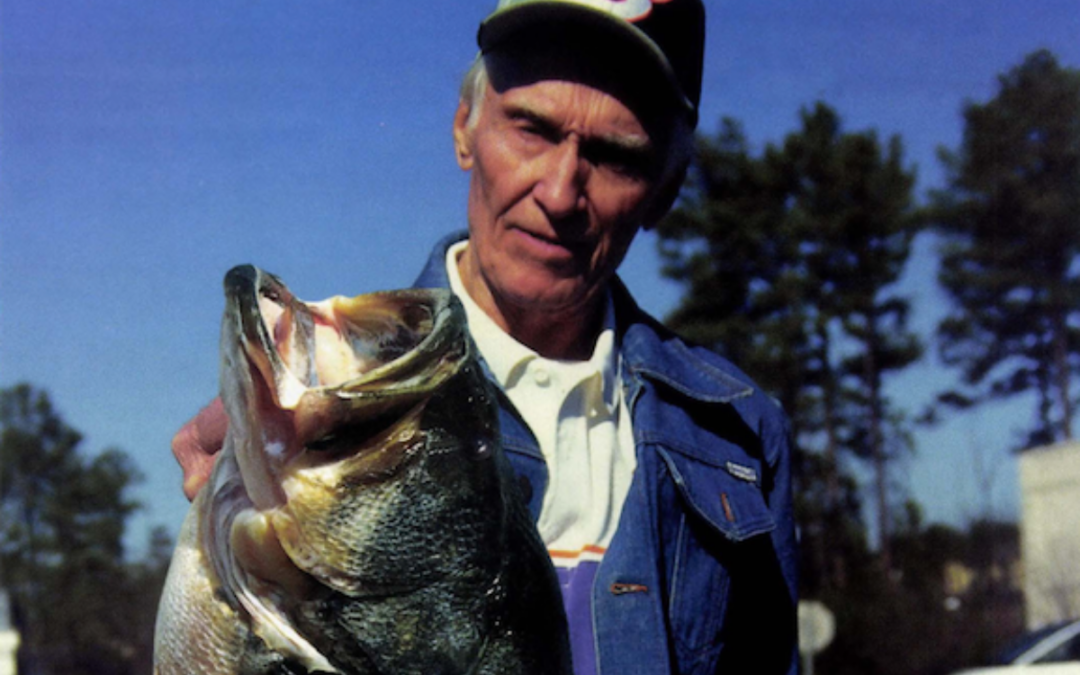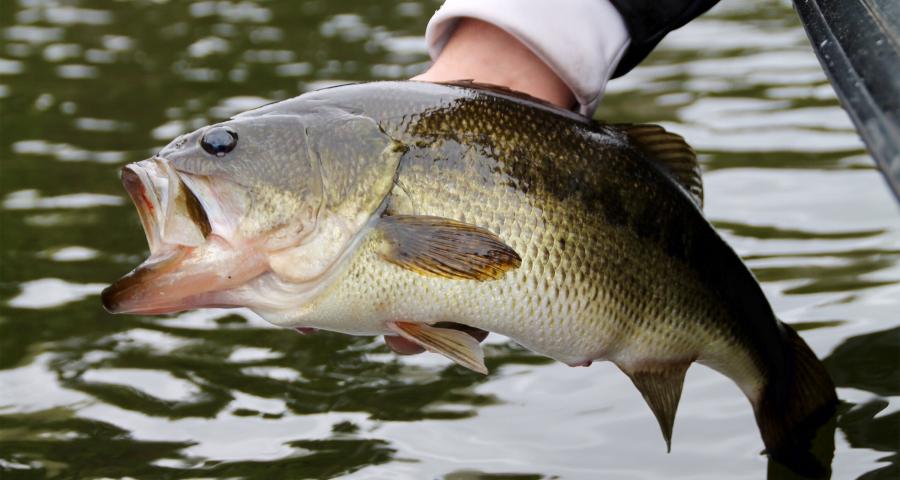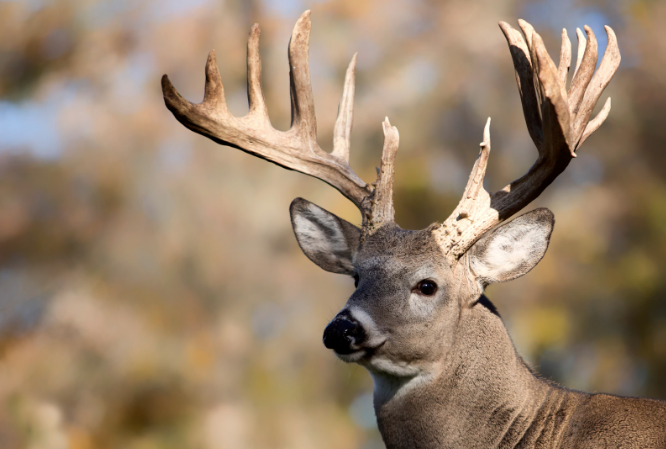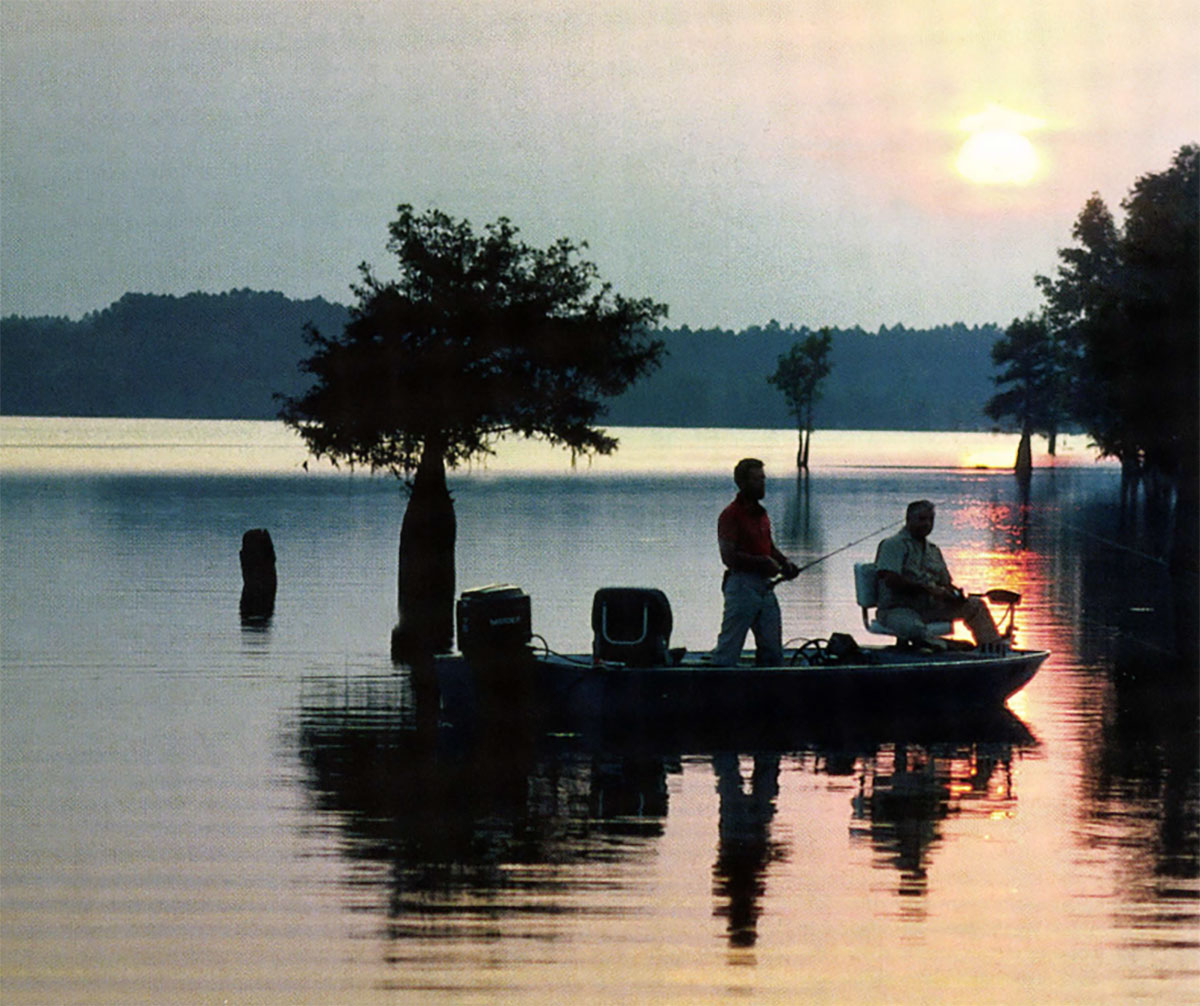In this Sporting Classics Daily exclusive, 68-year-old South Carolina angler, Roy Greer, reveals how he caught what may soon be recognized as the new world record largemouth bass.
From high-jumping rainbows in Alaska to quarter-ton marlin off Panama, from lakers in the Arctic tundra to tigerfish in Zimbabwe, Sporting Classics has covered many amazing fishing adventures over its 40-year existence. None, however, comes close in its historical import to the angling world as does the story you are about to read of the new world record bass.
At its center is a tall, angular, 68-year-old man with silver hair and an artificial leg; a wry and adamantly cheerful individual who seems little affected by the fact that he will soon find himself at the center of intense media scrutiny, and may, indeed, become very wealthy. This man, Roy “Peg” Greer, has likely won the bass fishing equivalent of the lottery, having caught and submitted for certification to the International Game Fish Association (lGFA) what may be the new world record largemouth bass.
The story begins one February day, the 18th to be exact, in the office of Chuck Wechsler, the books editor for Sporting Classics. I had been in South Carolina on business and stopped in on a whim to discuss some article ideas. It was the 19-century American writer, Ralph Waldo Emerson, who said we should write whim above our doorposts and live our lives accordingly. Never was I so glad to have followed one.
A Fish Ya’ll Might Wanna See
As we chatted back in his office, Chuck’s assistant stuck her head in and said there was a man in the lobby who wanted to show him something. He wouldn’t say what it was. Chuck invited me to go along, and there, standing in the lobby was Mr. Roy Greer.
At six-foot-four or so, he is one of those gangling people who seem to be leaning perpetually forward. He has a sharp chin that juts out adding to the lean-to effect. That day, Greer was wearing old hunting boots, a long-sleeved white undershirt and frayed gray pants that had seen their share of brush and briars; white sideburns ran down his cheeks from beneath a black, Dale Earnhardt cap with a large number three on the front. We shook hands all around.
Greer cleared his throat. “I gotta fish ya’ll might wanna see. It’s pretty good size, I think.” That’s all he said, then he started out the door. Chuck and I exchanged looks, then followed him. Greer walked with a limp, dragging his left leg noticeably. We followed him to a brown Ford Escort station wagon with a swamp-beaten jon boat strapped on top. He opened the back hatch and pointed to a red and white cooler among a clutter of rods and tackle. “It’s in there.”
We waited for him to explain or say something else. When he did nothing but stare off into the street traffic, Chuck asked him, “What’s in there?”
“A bass. Caught it late yesterday, and my nephew Todd…he gets your magazine…thought you guys might like to see it. You’re interested in stories about big fish, ain’t ya?”
Greer backed up a step and once again pointed toward the cooler. “Go head. Open it. It ain’t gonna bitecha.” With that he chuckled.
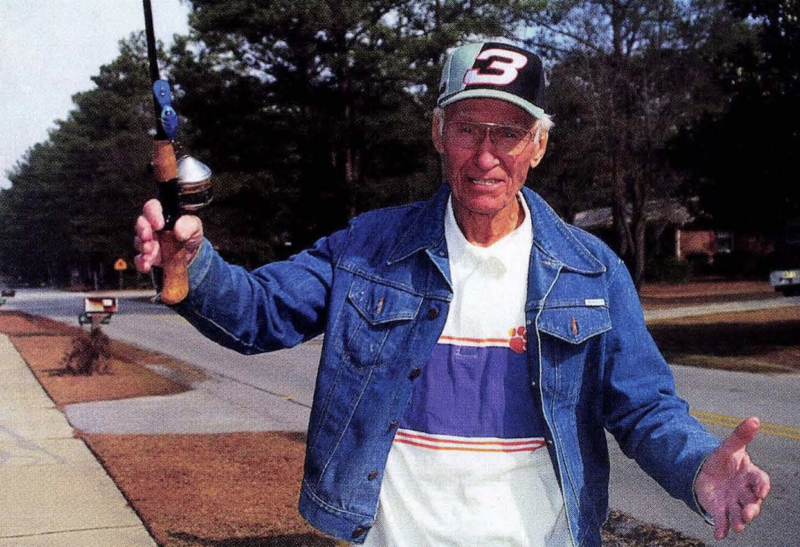
Greer demonstrates the length of a bass he caught and released several years ago which was even bigger than his pending world record fish.
Pretty Good Size
Chuck leaned in and popped the cover off the ice chest. Inside, indeed, was a bass. “Pretty good size,” as Greer had described it, was a world-class understatement. It was a huge, sprawling fish with a tail wide as a six-inch board. The cooler, which was about eighteen inches wide, barely contained the fish, whose head and tail curved up the sides. Chuck had a stunned expression on his face; finally, he stepped back and let me have a closer look. Monstrous was the word that popped into my head.
As I stood up, I banged my head on the overhanging stern of the old jon boat.
“Damn,” I said, rubbing my head.
Greer let loose his throaty chuckle again. “Boy, I do that ’bout once a day. You’d think I’d learn. I come to think of it as God’s way of reminding me I’m alive. You okay?”
“Yeah, I’ll live. You know, Chuck, this needs to be weighed and measured,” I said, taking in both men.
“What for?” Greer asked.
“This could be a world record bass. That thing surely goes over 20 pounds—and look at the girth. It could be 30 inches.”
Greer was unimpressed. “Heck, I caught one bigger than this.”
Chuck looked at me and shook his head in disbelief, then he turned back to Greer. “You’re kidding, right?”
“Naw, three years ago, no, four maybe. Well anyways, I figure that one was a tad longer than this one.”
Chuck asked the question on both of our minds. “What did you do with that one?”
“Let ’em go, a’course. These big ones ain’t much good for eatin, less’n you smoke ’em. Maybe this is the same fish an’ he went on a diet. Lost a pound or two.” Greer smiled at his joke.
“Bigger than this?” I asked, still not believing.
“Why’d you keep this one?” Chuck asked.
A Lot of Smoked Bass to Eat
Greer looked askance, shoving his long, thick-fingered hands into his pants pockets. “I don’t rightly know for certain. Just did I guess. Besides, look at that.” He pointed to a half-healed scar running from below the dorsal fin, then to a tear in the lower lip. “I must’ve torn the lip. Had to pull ’em out from under a tangle of roots, but that scar looks like a propeller blade to me. Nasty. Who knows how long this fish was gonna live? Me either, for that matter. It just seemed right to me. You ever see that Christmas picture show, the one with Jimmy Stewart?”
“You mean It’s a Wonderful Life?” I answered.
“Yeah, that’s the one. I mean, it’s like that. One thing changes a thousand others. That bass was swimming in its water, and I was swimmin’ in mine and we connected and maybe it was for a reason. Things happen for a reason, I believe. And there’s a reason for this, though I don’t know what it is for sure.”
I wasn’t certain I made the connection between the fish and the movie, other than that Greer probably had seen it on TV recently, but the connection was clear in Greer’s mind. Carrying on a conversation with him was like trying to follow a rabbit through a thicket; he always seemed just one hop ahead.
“If this is a world record bass, do you have any idea what that means?” Chuck asked.
“It means me and Todd got a lot of smoked bass to eat. Like I said, this size ain’t much good to fry up. Sometimes I cook ’em over hickory coals.”
Neither of us was sure if Greer was serious.
“It means,” Chuck said, “that you may soon be a millionaire.”
“For what?”
“For catching the new world record bass,” Chuck replied.
“Hah,” Greer turned away for a minute and stared off into the traffic again. “How’s that?”
A Million Dollars for a Bass?
Chuck briefly related the quest to break George Perry’s 1932 record bass, a Georgia fish that weighed 22 pounds, 4 ounces, and how everyone thought the new world record bass would come from California. He told him there would likely be endorsements, speaking engagements, that kind of thing.
“Talkin’ in front of people. Can’t say I’d be much for that.”
“All you’d have to do is tell them the story of how you caught the fish,” Chuck replied. “I suspect you’d warm to the task.”
“A million dollars, huh? That’d keep a fella in beans for a few years, wouldn’t it?”
“Beans? Hell, steak, champagne and caviar,” I said.
“I’d just a’soon be hav’n beans and ham,” Greer replied. “My wife, Sarah, God bless her soul, used to make beans and ham like you wouldn’t believe. Honey, blackstrap molasses, sweet onions, and then she’d add yellow mustard. Her own recipe. I make it sometimes, but it ain’t the same. It ain’t never the same after someone goes on. But I guess it’s not supposed to be.” His voice faltered.
There was an awkward silence before he leaped another hop ahead of us. “So what do I have to do with this fish to become a millionaire?”
“What did you catch him on?” I asked, thinking there might be an endorsement possibility with a lure manufacturer.
Nearly 32 Inches
Greer reached in the back of the Escort and pulled out a banged-up aluminum tackle box. He opened it and grabbed a four-inch wooden plug; a wide-bodied crankbait kind of lure with an amphibian eye and a big lip to make it wobble in the water. But what really stood out were its colors—bluebird blue on top with a bright orange belly. As odd as it looked, I had to admit to myself that I’ve certainly caught many fish on lures that looked more like miniature helicopters than anything in the natural world.
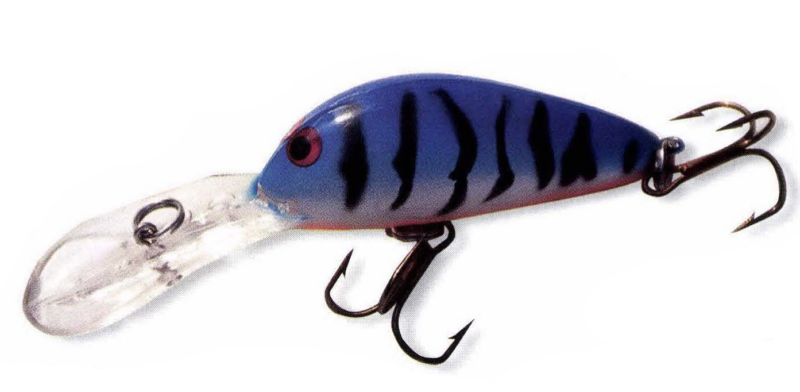
Greer shook the lure and it rattled. “Todd, lives over near Santee, makes these. He’s my sister Vera’s kid. She’s gone now, of course. Anyways, he hand-carves ’em and paints ’em and puts BBs inside.” He rattled it again before putting it back in the box. His hands were leathery and dotted with liver spots, the hands of a man who has spent his life at hard work in the sun and the wind.
“Chuck, is there somewhere we could weigh this fish?”
“Piggly Wiggly, just down the road,” Chuck replied. “But wait a minute ’til I grab my camera. We’ve got to document all this!”
I drove in my rental Cavalier with Chuck, while Greer followed. We lugged the cooler back to the meat counter and explained to the assistant manager what we wanted. His jaw dropped when Greer pulled the fish out and laid it on the scale. We watched the digital readout blink and settle at 22 pounds, 8 ounces. The assistant manager brought out the yardstick we had requested and placed it atop the fish. “It’s nearly 32 inches,” he whispered.
I looked at Greer. “You didn’t stuff any of your nephew’s lead down this fish, did you?” I meant it as a joke, but it was clear I had made a mistake. Greer didn’t laugh. Without saying a word, he hefted the fish off the scale and put it back into the cooler. He closed the cooler, picked it up and headed for the door, obviously laboring because of his bad leg. Chuck gave me a dirty look.
Ain’t That the Dickens
I hurried after Greer and caught up with him in the parking lot. “Look,” I pleaded, “I was just kidding.” It was clear that we were to be part of fishing history, and I didn’t want to blow it. I had images of Greer and his nephew sitting down to fillet and smoke a world record, and no one ever knowing about it. And certainly no one believing me or Chuck that this fish ever existed. Greer set the cooler down and stared at me. He had soft, gray eyes. “I might not have much in this life, but I’m no cheat and I don’t lie.”
“I’m sorry,” I said, extending my hand. I had to admire a man who would turn his back on fame and money because his honor had been questioned. He had my vote for president. He took my hand, his engulfing mine.
Then his eyes sprung to life. “A millionaire, huh? For a fish? Ain’t that the dickens? Ya know, Todd was let off from work a year ago, and he and his wife been makin’ do with two jobs that don’t pay squat. An’ they got a second kid on the way, too. Some extra money would sure do ’em good. Maybe that’s what this is all about?”
I didn’t have an answer for him, but by this time, Chuck had joined us. “Let’s get back to the office. I’ll call the DNR. We’ll get some more pictures, too. And we’ll need to get the paperwork started for IGFA certification.”
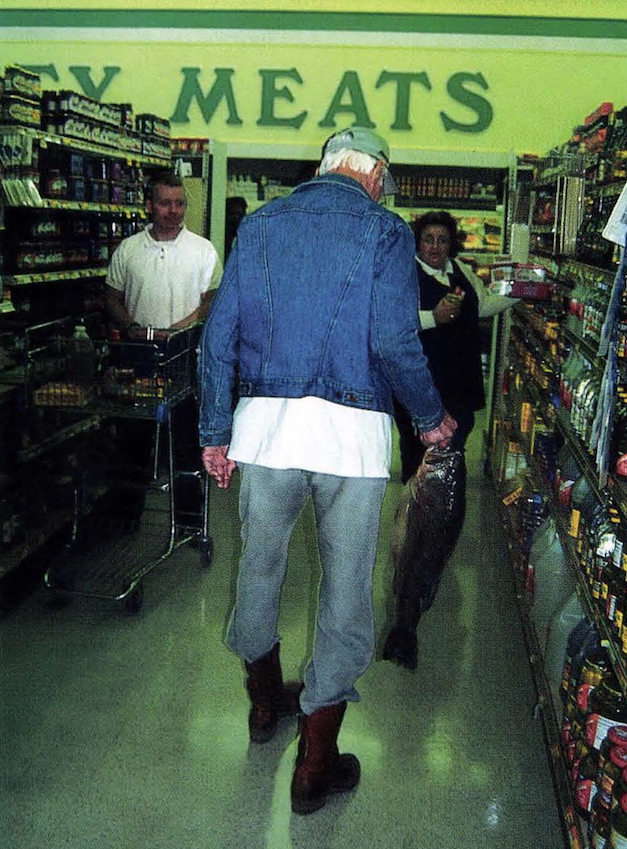 I had to leave to make a dinner meeting, but later the next day I called Chuck to find out what had happened. As it turned out, the bass, as certified by the South Carolina Department of Natural Resources, officially weighed 22 pounds and 7 ounces, not the 22-8 we had noted at Piggly Wiggly. Length was 31 3/4 inches and the girth was 29 1/8 inches.
I had to leave to make a dinner meeting, but later the next day I called Chuck to find out what had happened. As it turned out, the bass, as certified by the South Carolina Department of Natural Resources, officially weighed 22 pounds and 7 ounces, not the 22-8 we had noted at Piggly Wiggly. Length was 31 3/4 inches and the girth was 29 1/8 inches.
As to where the fish was caught, Greer said he routinely fishes secluded oxbow lakes along the Savannah River on the South Carolina-Georgia border. He has several ponds that he fishes deep in the oak forests down there, though he couldn’t give us directions “because they’re way the heck back in there. An’ there ain’t no trails to speak of, an’ in the spring the snakes are real bad if you don’t know where you’re goin’. I catch a lot of red-breasts in there, too. They go a pound, pound an’ a half maybe. But the bass, they get washed in when the river floods and stay because they like it. Then they grow real big.”
He said he discovered the area while working for the Macon-B&S Railroad. Over 30 years, he had held various jobs with the company, then was disabled when a load of timber broke free from a flatbed car and pinned him. He said it took more than two hours to get the logs cleared. His left leg had been crushed from the knee down, and now he wears an artificial limb that seems to have slowed him down only a little. And it was his prosthesis that earned him the nickname “Peg.” As he explained it: “I always called Todd, Tad, short for tadpole, ’cause he was such a squirt. Then when I lost my leg, he started callin’ me Peg-leg, then it just got shortened to Peg. We was always friendly, being kin an’ all, but now he’s like a son to me. Guess that’s something good that came out of losing my leg.”
A Possible New World Record Bass
The old-timer makes his home in the little South Carolina hamlet of Gillisonville, where he lives alone off his pension and his social security. His wife, Sarah, died of lung cancer several years ago, and they had no children. His only immediate relative seems to be Todd Posof, the magic lure carver, over in Santee.
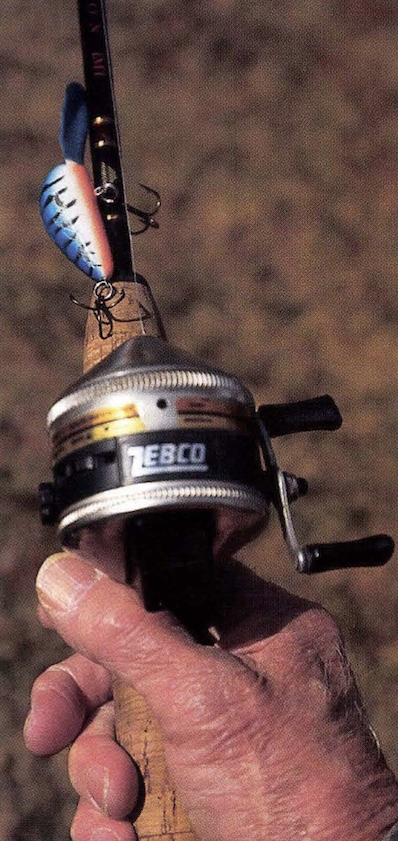
Greer caught the big bass using an old Zebco 33 reel mounted on a brand new Pinnacle Vision IMT rod, a gift from his nephew who carved the “bluebird” plug.
Greer caught the huge bass on 17-lb. Stren Clear-Blue monofilament, using a dented but serviceable Zebco 33 spincasting reel and a new, seven-foot Pinnacle rod given to him by his nephew last Christmas. He was fishing from his scarred Sears & Roebuck jon boat, which he bought second hand in the early 1960s.
At this writing, Chuck’s photographs and the DNR certification are at IGFA headquarters in Florida. Preliminary approval should be completed soon; the fish itself is in a freezer at the Division of Game & Fish.
I’m not sure that I, Chuck and his colleagues at Sporting Classics could be any more thrilled about Roy Greer’s fish, unless one of us had actually caught it. Waiting for certification of the new world record bass is comparable in my experience only to awaiting the birth of my daughter 21 years ago. In fact, I think all of us are considerably more excited than the prospective new world record holder himself is.
And as for Roy “Peg” Greer, maybe he’s thinking about what he will do with his money and how he will spend his 15 minutes of fame. But I wouldn’t count on it. More likely he’s out tossing Todd’s odd-looking rattle lure in some slackwater pond. Maybe he’s looking for that bigger fish he threw back. Or maybe he’s fishing just because sometimes in doing so you discover connections that make a larger meaning of your life. From what I know of Roy Greer, I’d put my money on the last.
Editor’s Note: After returning from the weigh-in at South Carolina Game & Fish, my very first call was to Ray Scott, the founder of B.A.S.S. I provided him with Greer’s phone number and Scott called me back less than an hour later.
“There’s a sad note to this because it puts to rest the legendary story of my old friend George Perry, who held the record for so many years,” Scott told me. “I expected the largemouth record to be broken one day, but I didn’t know if it would happen in my lifetime. It’s ironic that it came from the Southeast.
“Peg is a shy, homespun type who will prove fascinating to a lot of people,” Scott added. “He’s a plain vanilla sort of guy who deserves the honor and the good fortune of catching that fish.”
There is a fishing manufacturer that is gearing up for the storm of publicity. Greer’s nephew has already been paid a total of $25,000 for the international marketing rights to his crankbait and has begun production. We wish to thank Roy Greer for graciously permitting Sporting Classics to publish the story of his pending world record bass. Because the fish has yet to be officially accepted by the IGFA, we decided to reveal his remarkable accomplishment via this article rather than announcing it in a press conference.
Certainly, if Roy’s huge largemouth is declared the new world record bass, there will be a media blitz over this April Fool’s spoof unlike anything the angling world has ever seen.
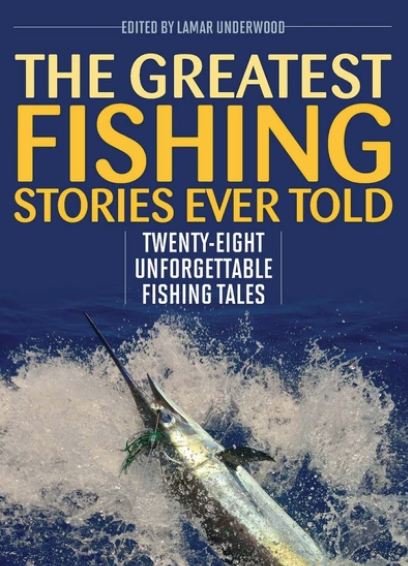 The Greatest Fishing Stories Ever Told is sure to ignite recollections of your own angling experiences as well as send your imagination adrift. In this compilation of tales you will read about two kinds of places, the ones you have been to before and love to remember, and the places you have only dreamed of going, and would love to visit. Whether you prefer to fish rivers, estuaries or beaches, this book will take you to all kinds of water, where you’ll experience catching every kind of fish. Shop Now
The Greatest Fishing Stories Ever Told is sure to ignite recollections of your own angling experiences as well as send your imagination adrift. In this compilation of tales you will read about two kinds of places, the ones you have been to before and love to remember, and the places you have only dreamed of going, and would love to visit. Whether you prefer to fish rivers, estuaries or beaches, this book will take you to all kinds of water, where you’ll experience catching every kind of fish. Shop Now

